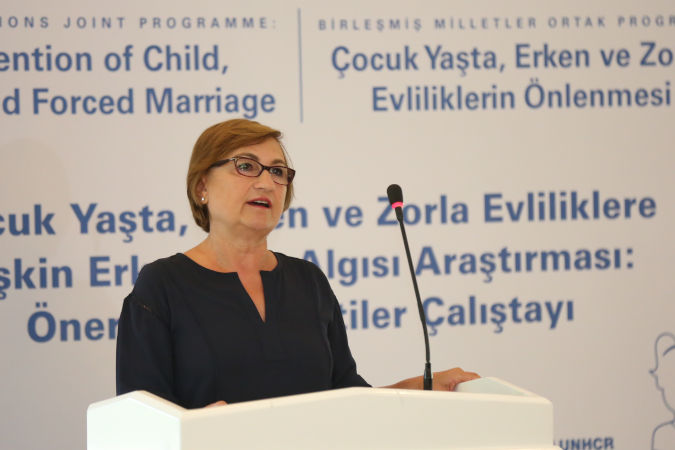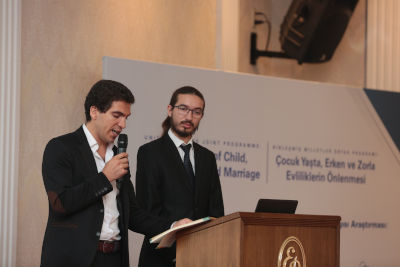Forced and early marriages leave both girls and boys behind
UN Women workshops in Turkey introduce participants to upcoming perception research on men’s attitudes and beliefs towards early and forced marriagesDate:

Prof. Dr. Hale Boratav made a presentation about a nationwide fatherhood research. Photo: UN Women
About 15 per cent of Turkish women are married before the age of 18[i]. UN Women recently organised one-day workshops in Gaziantep and İzmir to help academics and representatives of service providers, NGOs and professional associations understand child, early and forced marriage from men’s perspective.
“It was stimulating to talk about the impact of early marriages on boys as we usually only discuss their impact on girls. Early forced marriages leave both girls and boys behind,” said Esin Özgül, Chairperson of the Gaziantep CEID (Association for Gender Equality Monitoring).
Held under the UN Joint Programme on Child, Early and Forced Marriages (CEFM) in Turkey, the workshops introduced participants to upcoming perception research on men’s attitudes and beliefs towards early and forced marriages, and asked them about early and forced marriage dynamics and practices in their communities and their research expectations.
The research will examine the attitudes and beliefs of men from a variety of backgrounds and communities towards child, early and forced marriage and seek ways to change behaviours and facilitate men’s engagement in eliminating child, early and forced marriage and in advancing gender equality.
The workshops began with a presentation on masculinity research by Prof. Dr. Murat Göç and Prof. Dr. Serpil Sancar, who said that that masculinity practices triggered violence against women and that studying male perceptions and masculinity practices was critical to understanding issues arising from patriarchal practices. Prof. Dr. Hale Boratav made a presentation about a nationwide fatherhood research.

They were followed by representatives of SAM (Social Research Centre), the company that will conduct a nation-wide research which will be held this year, briefly described their research methodology.
In afternoon roundtable discussions, participants discussed how child, early and forced marriage affected men and boys and examined common potential research areas. Importantly, participants felt any research needed to:
- Include decision-making men such as prosecutors and judges in the study
- Investigate media perceptions of child, early and forced marriage
- See children and parents as change agents to combat child, early and forced marriage
- Examine if early marriage is seen as a gain in social status for children involved
- Take into account regional differences in child, early and forced marriage practices
- Develop a research results-based method and guide for use in future community-based studies on men and boys.
Some attendees said that the more needed to be done to collect data on early and forced marriages.
“Often, we only become aware of early and forced marriages when a child is born, making data on forced marriages difficult to collect. Universities and UN agencies should do field research on this issue,” says Hülya Gültekin, a lawyer from İzmir, Turkey active in women’s rights NGOs, who said the workshop was inspiring and taught her to look at early and forced marriages from different perspectives.
Launched in January 2018 with financial support from the Swedish Development Cooperation Agency (SIDA), the UN Joint Programme on the Prevention of CEFM in Turkey Is jointly implemented by UN Women, UNICEF, IOM, UNFPA and UNHCR. Currently implemented in the 12 Turkish provinces, including Istanbul, Ankara and Gaziantep, the Programme uses a holistic approach to end child, early and forced marriages, focusing on violence against women and children, child protection and education systems, health, sexual and reproductive health, human trafficking and forced displacement.
UN Women contributes to the Joint Programme by generating data and holding public awareness activities on the legal, health, social, psychological and economic consequences of child, early and forced marriages.
[i] https://turkey.unfpa.org/en/news/united-nations-joint-program-working-eliminate-child-early-and-forced-marriage